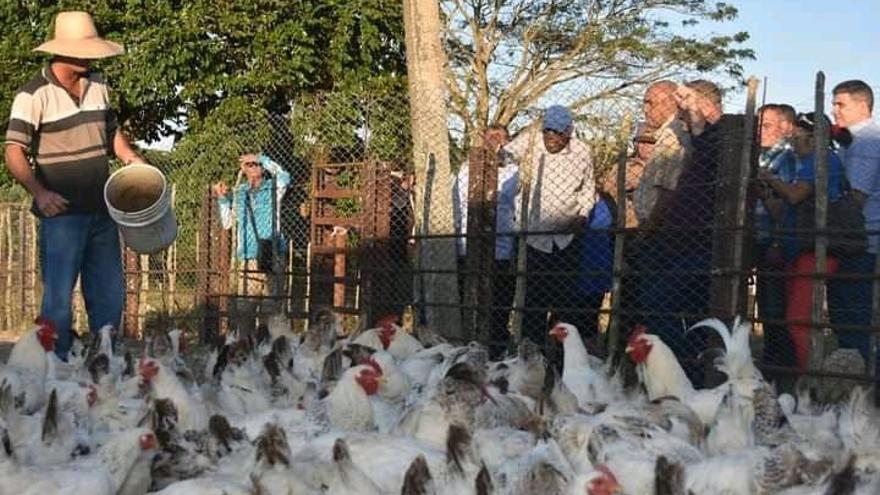
![]() 14ymedio, Madrid, 14 April 2023 — Barely two days had passed after learning that the authorities had invested 12 times less in the agricultural sector than in business and real estate services, when the country’s top authorities urged farmers to look for “alternative solutions” due to the lack of “money to import all the resources required by the sector.”
14ymedio, Madrid, 14 April 2023 — Barely two days had passed after learning that the authorities had invested 12 times less in the agricultural sector than in business and real estate services, when the country’s top authorities urged farmers to look for “alternative solutions” due to the lack of “money to import all the resources required by the sector.”
The prime minister, Manuel Marrero, did not have the slightest embarrassment in accusing the workers of bad results, saying that the results of the measures put into practice “are poor, in a sector in which only 20% of production is in the hands of the state sector, and the other 80% is under non-state management.”
The reproach came to light in the annual review meeting of the Ministry of Agriculture this Thursday in Havana. The dismal results of the famous 63 measures to stimulate agricultural production were shown; although reluctant to recognize them, the leaders alleged, without any proof, that if the measures had not been approved “the situation would be worse.”
Among the star proposals of that package, announced in April 2021, was the possibility of charging excess production in foreign currency, a system that has never worked well due to arrears and non-payments, something recognized this Thursday at the meeting.
“The defaults to producers, at the end of December, reached 16,842,385 pesos [$701,766] showing a downward trend compared to previous periods,” reported the official newspaper of the Communist Party this Friday.
Given this lack of payment, which is what mainly motivates producers, it is understood that the results of 2022 were catastrophic. But the losses were not specified, and the authorities limited themselves to saying that “most productions did not reach the planned volumes.”
Among the products whose forecasts were met were corn, sorghum, beans and soy, but the same did not happen with complete groups of food, such as meat, vegetables, citrus fruits and fruit trees, in addition to the so-essential rice, basic in the daily diet of Cubans.
The detail of animal protein products is bleak, especially when a few days ago the Government mentioned its intention to maintain the goal of reaching a monthly consumption of 5 kilos [11 pounds] of these nutrients. Neither beef, nor pork, nor equine, nor eggs nor milk reached the planned projections. On the other hand, it was reached by a product that in recent times stands out, uniquely, for its lower price: mechanized tobacco.
However, the plans for agricultural tobacco, the twisted, black and blonde varieties and the total cigar were not fulfilled.
The excess of bureaucracy, which the leaders don’t consider their fault, also hindered the delivery of idle lands, which amount to 258,288 hectares [638,244 acres].
The State newspaper Granma completes the information with two other articles dedicated to the agricultural sector in its edition this Thursday, where the same authorities encourage exploiting “the potential” of the municipalities and self-sufficiency, something that in the conditions of absolute scarcity that the country is experiencing is less than a patch.
The third article calls attention to the tour of Salvador Valdés, vice president of the Republic, through the free-range hen farms, stating that they can help replace imports. The eggs have higher nutritional value and receive a high price in rich countries, compared to the eggs of caged hens, whose advantage is the massive production that a hungry country needs.
The president urged, as if that were not enough, “overcoming all limitations,” and he asked companies to “catch up” with their debts to producers. “It is not possible,” he said, “to stimulate production if money is owed to the producer.” However, he avoided any responsibility despite being the country’s second highest authority.
So much informative emphasis and urgency to produce more contrasts with the money invested and decisions made at the highest level. Although the Cuban economist living in Spain, Elías Amor, believes that concern exists despite appearances, no one wants to make the necessary decisions.
“There is more desperation with agricultural production than it seems. Behind inflation and closely related to this problem, Cubans complain about the lack of food and the prices of products. Agricultural production doesn’t succeed, and communist solutions don’t work. They have to think about taking a 180-degree turn and starting over. The longer it takes, the worse it will be,” he said in his blog, Cubaeconomía.
Translated by Regina Anavy
____________
COLLABORATE WITH OUR WORK: The 14ymedio team is committed to practicing serious journalism that reflects Cuba’s reality in all its depth. Thank you for joining us on this long journey. We invite you to continue supporting us by becoming a member of 14ymedio now. Together we can continue transforming journalism in Cuba.
